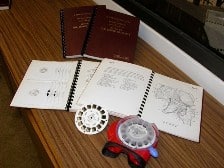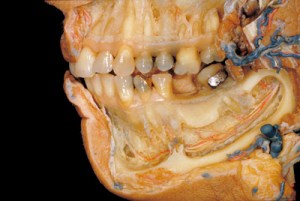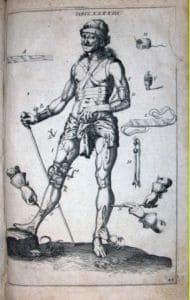 Visitors to the John Martin Rare Book Room are often bemused when they spot a View-Master resting on one of the bookcases. If you’re under the age of sixty-five you probably owned one of these devices along with several View-Master reels depicting far-off countries, cartoon characters or comic book heroes rendered in 3-D. But why a viewer in the rare book room? In 1962, Dr. David L. Bassett, anatomist from the University of Washington, working with William Gruber, the inventor of the View-Master created the “Stereoscopic Atlas of Human Anatomy” — over 1,500 slides of three-dimensional color images of human dissection. Nearly fifty years later the 25 volume collection remains a marvel of relatively simple technology that still elicits gasps of wonder from viewers as they behold in stark clarity the “in-depth” photographs of body structures and cavities. Each of the slides is accompanied by commentary written by Dr. Bassett (the lone dissector) and a line diagram that labels all of the structures.
Visitors to the John Martin Rare Book Room are often bemused when they spot a View-Master resting on one of the bookcases. If you’re under the age of sixty-five you probably owned one of these devices along with several View-Master reels depicting far-off countries, cartoon characters or comic book heroes rendered in 3-D. But why a viewer in the rare book room? In 1962, Dr. David L. Bassett, anatomist from the University of Washington, working with William Gruber, the inventor of the View-Master created the “Stereoscopic Atlas of Human Anatomy” — over 1,500 slides of three-dimensional color images of human dissection. Nearly fifty years later the 25 volume collection remains a marvel of relatively simple technology that still elicits gasps of wonder from viewers as they behold in stark clarity the “in-depth” photographs of body structures and cavities. Each of the slides is accompanied by commentary written by Dr. Bassett (the lone dissector) and a line diagram that labels all of the structures.  The Hardin Library is fortunate to own a complete set of this amazing work which is beginning to arouse the curiosity of anatomists interested in using high-tech solutions to bring 3-D to desktop computers. In the meantime the marvelous handiwork of Mr. Gruber and Dr. Bassett is at your disposal.
The Hardin Library is fortunate to own a complete set of this amazing work which is beginning to arouse the curiosity of anatomists interested in using high-tech solutions to bring 3-D to desktop computers. In the meantime the marvelous handiwork of Mr. Gruber and Dr. Bassett is at your disposal.
You can read about and view more images of Dr. Bassett’s work here.
MedlinePlus® Debuts Health Information in Multiple Languages
On May 7, 2008, MedlinePlus debuted its new multilingual feature, the first of its kind. MedlinePlus is a service of the National Library of Medicine, and a website dedicated to providing its online visitors with the latest in health information and links to other helpful sites. Seeing a need for medical help online in languages other than English or Spanish, the site now offers its information in over 40 different languages.
The feature was created after new statistics revealed an overwhelming demand for medical help in languages other than English. One such statistic stated that in a 2006 survey, of over 850 hospitals nationwide, 80% treat patients with limited English proficiency. To help combat this language barrier, the site now contains over 2,500 links to information and covers nearly 250 health topics, all in over 40 different languages.
To ensure accuracy and relevance, the site uses its same quality guidelines for its 40 plus new languages that it currently uses for its English and Spanish translations. One such standard is that all information published on their site must be produced by the United States Federal government or a U.S.-based organization. MedlinePlus also ensures that no matter what language its information is being displayed in, all information included on their site is reliable and current.
To visit the MedlinePlus site: http://medlineplus.gov/
Women in Science Book Discussion Group
Women in Science Book Discussion Group this summer at WRAC
This group will focus on women in science, their successes and failures, and the types of experiences they have faced in a male-dominated field. Participants will read and discuss 3 biographies of noted female scientists and 1 book focused on the issues women face in the sciences:
1) Madame Curie: A Biography (Eve Curie)
2) Rosalind Franklin: The Dark Lady of DNA (Brenda Maddox)
3) The Tangled Field: Barbara McClintock’s Search for Patterns of Genetic Control (Nathaniel Comfort)
4) Who’s Afraid of Marie Curie? The Challenges Facing Women in Science and Technology (Linley Erin Hall)
The group will meet on Wednesdays at 7:00 pm at the Women’s Resource and Action Center on the following dates:
June 11
June 25
July 9
July 23
Pre-registration is requested; participants may join at any time. Register at www.uiowa.edu/~wrac/groups/womenscience.htm
Rare Book Room Open House!
The John Martin Rare Book Room will hold its annual open house on Thursday, May 15 from 4:30 to 7:30.
The exhibit, “’No Small Presumption’–Surgical Works From Six Centuries,” will feature rare books from the earliest days of surgery through the twentieth century. Although chloroform and ether were not widely used before the second half of the 19th century, a surprising number of surgical procedures were employed hundreds and even thousands of years ago, including operations for cataracts, bullet removal, hernias, club foot, and bladder stones. The open house will allow visitors to view and page through the early texts and illustrations used by surgeons for instruction and guidance.
Of special interest are the woodcuts and engravings of the elaborate and sometimes quite modern instruments developed over the centuries for specific tasks, including drills, scalpels, and saws designed with speed and efficiency in mind. Important early works in anesthetics and antisepsis will also be featured.
The exhibit is part of a series of public lectures and presentation sponsored by the University of Iowa History of Medicine Society.
The John Martin Rare Book Room is located on the fourth floor of the Hardin Library for the Health Sciences. For additional information, please contact Ed Holtum, Curator at 335-9154.
*This event is open to the public.
Hardin MD serves Iowa & the World
See Flickr pictures of 21 pages linking to Hardin MD in Iowa …
… and 50+ countries around the world – Canada, UK, China, Spain, Turkey …

* * * * * *
[medical information, medical sites, medical websites, health info, hardinmd]
This is National Library Week- enjoy a video
Academic libraries answer over 70 million reference questions every year. This video will give you an idea what it is like to work at a reference desk.
Clinical Education position available
For more information, please review the complete job announcement.
Reporting to the Assistant Director for Collections and Outreach, the Clinical Education Librarian plans, promotes and provides information services that support the needs of residents and, to a lesser degree, faculty, researchers, staff and students, of the Carver College of Medicine and the affiliated hospital.
• As liaison to academic and clinical units, cultivates relationships with residents and faculty to identify opportunities for library partnerships with education and health care programs.
• Develops and teaches tailored library education sessions. Coordinates education services for liaison units. Works with faculty to integrate library education into the curriculum.
• In support of research and education, assists patrons with research and information management tools and skills through individual and small group consultations. Coordinates consultation services for liaison units.
• Partners with other librarians to market library services and promote increased awareness of scholarly communication issues on the health campus.
• Provides information and circulation services at the public service desk in-person and via telephone, email and instant messenger.
• Investigates new technologies and works with others to develop and revise programs to respond to the changing information needs of members of the health campus.
• Works with other Hardin Library staff members on public services projects for the health campus and health professionals and consumers in the State of Iowa.
• Serves on Hardin Library, University Libraries, health colleges, university and hospital committees and working groups.
• Contributes to and learns from the profession through such avenues as local, state and national professional organizations and publications.
Don’t forget to check out new 3rd Floor Display!
 Don’t forget to stop by Hardin’s newest exhibit, Simple Medicines, located near the 3rd floor doors of the Hardin Library. The display on herbs and herbal medicinal treatments spotlights the work of French scholar Matthaeus Platearius (d. 1161).
Don’t forget to stop by Hardin’s newest exhibit, Simple Medicines, located near the 3rd floor doors of the Hardin Library. The display on herbs and herbal medicinal treatments spotlights the work of French scholar Matthaeus Platearius (d. 1161).
The lustrous images in this exhibit have been copied from a facsimile of a remarkable manuscript published in the last part of the 15th century, Le livre des simples médecines (The book of simple medicines). The original manuscript is housed in the Russian National Library at St. Petersburg [Barcelona: M. Moleiro, 2000].
Beginning around the 11th century, European scholars began translations of ancient Greek works, using as their sources, Arabic translations that were preserved during the Middle Ages by Islamic scholars. One of the most important of these translations (De medicinis simplicibus (“On simple medicines”) was completed in the mid 12th century by Matthaeus Platearius (d. 1161), a physician from Salerno, Italy, an important translation center.
Platearius’ text found its way into numerous manuscripts but none as beautiful as the codex produced for Count Charles of Angoulême and his wife Louise of Savoy. Most of the text is taken from Platearius’ French translation with additional material from later writers. The text includes sections on herbs and flowers, trees, metals & minerals, and animal products. It is followed by a magnificent 116 page atlas depicting “simples” – plants used in treating diseases. The striking artistry was probably the work of Robinet Testard (fl 1475–1523), the French illustrator and illuminator.
Of interest, too, are the written annotations added by two physicians who insert Latin and Greek names for many of the plants and who provide additional commentary.
History of Medicine Society to Host Annual Banquet, Friday, April 25
The University of Iowa History of Medicine Society will host its annual R. Palmer Howard Dinner, Friday, April 25, 2008. The reception will begin at 6:00 pm followed by the dinner at 7:00 on the 8th floor, Roy Carver Pavilion, UIHC.
The after-dinner speaker will be, Walton O. Schalick, III, Md, PhD, Assistant Professor of Medical History, University of Wisconsin-Madison who will speak on ‘Humanizing’ Disability Care: Pediatrics, Policy and Crippled Children in the US and Europe, 1802-1945. The event is open to the public. Please click here for a reservation form.
Dr. Schalick’s research interests include medieval medicine and pharmacology, the history of children with physical disability in 19th and 20th century Europe and the US, and the practical ethics of pediatric emergency research. His is in great demand as a lecturer and has delivered presentations on four continents. Dr. Schalick is also the recipient of numerous honors, including the William b. Bean Award from the American Osler Society. After completing his undergraduate work at Washington University in St. Louis, Dr. Schalick received his PHD and his MD from Johns Hopkins University.
Hardin does Good
We recently found these kind words about Hardin Library and Hardin MD in Google Book search, in the book Health information on the Internet, by Rowena Cullen (Univ of Wellington, New Zealand).

“Medical Libraries with a Public Good Focus — There are a number of medical school libraries that consciously fill a public good role. The Hardin Library for the Health Sciences at the University of Iowa has a very extensive site, Hardin MD (http://www.lib.uiowa.edu/hardin/md/index.html). The site is well maintained, and it links to some key resources in Spanish, medical illustrations, and hundreds of other medical library sites throughout the world.”
Here’s a Flickr picture of the citation and the page in Google Book search.
* * * * * *
[medical information, medical sites, medical websites, health info, hardinmd, medical pictures, common good, google books, google book search, medical libraries]
